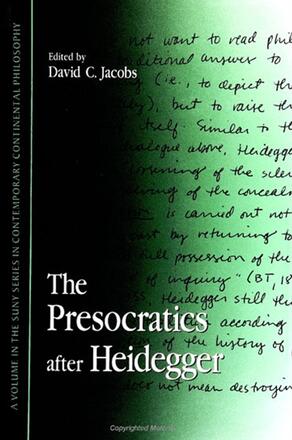
The Presocratics after Heidegger
Alternative formats available from:
Reads Presocratics such as Homer, Anaximander, Anaximenes, Parmenides, Heraclitus, and Empedocles from within the realm opened up by Heidegger's thinking.
Description
Offering a diversity of strategies and approaches to the philosophical issues involved in reading and thinking about the Presocratics in the wake of Martin Heidegger's thought, the authors explicate the thinking of key figures such as Homer, Anaximander, Anaximenes, Parmenides, Heraclitus, and Empedocles. The philosophical problems of logos, logic, truth, history, tradition, ethics, and tragedy are presented and re-thought in relation to Heidegger's thinking. Not only is the role of the Presocratics in Heidegger's reading re-thought but also, following a trajectory opened up by Heidegger, questions and readings of the Presocratics that he himself did not broach are pursued. These include: How does logos change in Heidegger's dialogue with the Presocratics? What is the place of the Presocratics in the "other inception" of thinking? How is Heidegger's reading of tragedy also a dialogue with Nietzsche and Ho¬lderlin? How do concealment and disclosure function in Homer's corpus? Do the pronouncements of Anaximander bring us to think the beginning of history and to question the need for ethics and justice? How does Anaximenes come to think and speak all that manifests itself? What is the role of presence in Parmenides' divine pedagogy? How does Heidegger come to remember Heraclitus and what is the disruptive nature of Heraclitus' sayings?
Contributors include Walter A. Brogan, Jean-Francois Courtine (translated by Kristen Switala and Rebekah Sterling), Parvis Emad, VeŒronique M. FoŒti, Hans-Georg Gadamer (translated by Peter Warnek), Martin Heidegger (translated by Will McNeill), David C. Jacobs, David Farrell Krell, Michael Naas, John Sallis, Dennis J. Schmidt, Charles E. Scott, and Michel Serres (translated by Roxanne Lapidus).
David C. Jacobs is Assistant Professor of Philosophy, University of Tennessee at Chattanooga.
Reviews
"This is the first in-depth treatment of the pre-metaphysical dimension of Greek thought from a loosely Heideggerian perspective. The quality here is in the contributors that Jacobs has assembled—in general the best figures for such a project among American continental philosophers with additional contributions from abroad." — Tom Davis, Whitman College
"The list of contributors—from Heidegger himself, through Gadamer, Serres, and Courtine, to the very best of Heidegger's American readers—will secure a wide readership for this volume. These readers will not be disappointed." — Robert Bernasconi, The University of Memphis